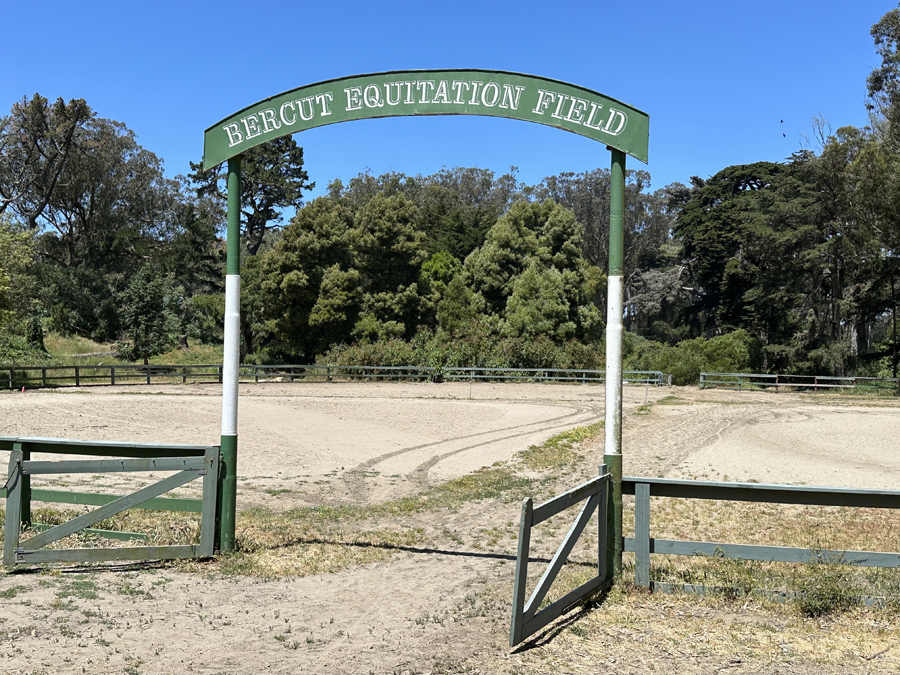Charges of Neglect and Abuse Result in SF Rec. and Park Revoking Operating Permit
By Thomas K. Pendergast
A horseback-riding company was evicted from Golden Gate Park after allegations of neglect from former staff members led to the Recreation and Park Department revoking its permit to operate at Bercut Equitation Field.
The Chaparral Corporation, which maintains and cared for horses there and at Camp Mather (a summer camp run by the department), was evicted from both locations after numerous complaints about the treatment of the horses came to light from a three-month investigation by the San Francisco Standard.
“Upon gaining a deeper understanding around the care of Chaparral’s operations, we decided to revoke our permit with Chaparral Corporation, covering both Golden Gate Park and Camp Mather,” said the department’s Communications Manager Daniel Montes. “While an Animal Care and Control investigation determined Chaparral met the minimum standards for horse care under the law, we no longer believe they met the high standards we expect from our park operators.”
The owners, Shawn Mott and Susan Pennell, did not return calls or answered messages seeking comment for this article. However, in the SF Standard article they denied the abuse allegations, stating they tried their best to operate in a challenging situation. They claim that they gave their horses adequate medical treatment and a caring environment with enough food, water and shelter.

A 2021 whistleblower report by an anonymous former staff member, however, describes a very different situation.
“Staff members have repeatedly expressed frustration that their concerns with horse health are not taken seriously,” the report said. “This has led to a degradation in communication between staff and upper management and has compromised the welfare of the horses. Staff were discouraged from contacting Sue or Shawn for vet care by onsite management who said that upper management would be unreceptive to questions and requests for horse care.
“This lack of communication and trust may have contributed to (the horse) Beamer’s unfortunate passing as the early warning signs of her worsening care were overlooked. This is compounded with the issue that many of the staff members on site were not experienced horse people. They were largely uneducated in how to diagnose and treat common ailments. And all staff are incapable of administering veterinary care to help or ease suffering with one exception (no longer employed).”
Among numerous complaints was the horses were simply overworked, even after a staff member requested management reduce the workload.
“Even so, upper management added additional events to Sundays rather than removing events from Saturdays, further increasing their workload,” according to the whistleblower report. “Regardless of staff feedback, Chaparral continued to increase the workload, adding beach rides and adding to the camp schedule. Though they brought in three new horses in April … two of those horses have become unusable in the program … through recurring lameness and a colic episode on July 3, 2021.
“At the time this document is being written, the horses are working every weekday including weekends (10 a.m.-5 p.m.) and as often as ever (approximately 40 clients per day). They are used for summer camp from 9 a.m.-1:30 p.m. (about 40 kids per day). About 5-6 horses are used for another two hours for advanced camp. Advanced camp is heavier work than kids’ camp, usually having the horses trotting and steering.
“Some lessons, saddle club (3-6 riders) and beach rides are also scheduled during the week.
“This is an unprecedented workload. As a result, horses are put under a great deal of stress, tied and tacked most of the day in the sun without shade, and some have been coming up lame or ‘off.’ Additionally, horses have been exhibiting behavioral issues (biting, kicking, bucking, bolting). With proactive changes to horse management allowing horses adequate rest, veterinary treatment and forage, as well as some reduction in workload, these horses may be able to recover and proceed with less injury.”
The report also states the indoor sleeping quarters of the horses were not big enough, leading to problems of the horses not getting enough sleep. And they were not kept clean enough.
“Due to the relative size of the horses to their stalls, the stalls rapidly fill up with waste causing the majority of the bedding to become soaked and dirty,” according to the report. “As a result, the few horses that do lay down (on occasion) are found in the morning soaked in manure and urine.”
It gave examples of neglected horses and alleged results from that neglect, citing three horses in particular: Jack, Sammie and Beamer.
“Jack was found colicking in a recumbent position. Onsite care was unable to rouse Jack and the episode was beyond the scope of onsite care. Veterinary care is only obtained under the purview of Sue and/or Shawn, who are not onsite to assess or react. When notified, the response by upper management was that ‘Jack just has to work through it’ as well as a thumbs-up emoji and no vet was acquired.
“Sammie, a bay Arabian mare with one sock on the right hind came up with lameness and swelling in the left hind preventing her from bearing weight on the limb for any significant portion of time. An employee alerted on site management on June 13, 2021, who relayed the message to upper management.
“Upper management told them to wait and see if the condition resolved. Shawn came out to examine Sammie during the week, but did not contact a veterinarian. The leg was poulticed and wrapped and Sammie was taken out of work. However, she continued to show signs of pain on this limb and spent most of her time outside of her stall laying down. Sammie was finally removed to Woodside for treatment the morning of June 20, 2021, after a full week of evident pain.
“Beamer ‘underwent two instances of severe colic in my time at Chaparral GGP. When the first episode occurred, she was found laying down at the end of the day, was unwilling to get up, and had white gums. As Chaparral does not employ a vet for their GGP horses, a staff member had to drive to the Woodside area to acquire banamine, an NSAID pain relieving medication from the farrier/handyman (a round-trip of about two hours). Upon administering banamine, Beamer recovered.
“On the morning of Wednesday, June 30, 2021, Beamer again colicked, following several weeks of weight loss, increased biting and lethargy in lessons, which was noticed by myself and onsite staff.
“On that morning, Beamer was reported to be somewhat less reactive to having her cinch tightened that morning, but staff was not aware that she was in duress until she collapsed in the middle of a camp session. Staff was able to remove the rider beforehand, but had to bring Beamer to her feet again to remove the saddle. She laid down repeatedly despite efforts to keep her standing and walking, which is evidence of extreme duress. She was humanely put down at Woodside, which spared her a long journey with a likely poor prognosis.”
Categories: Golden Gate Park













